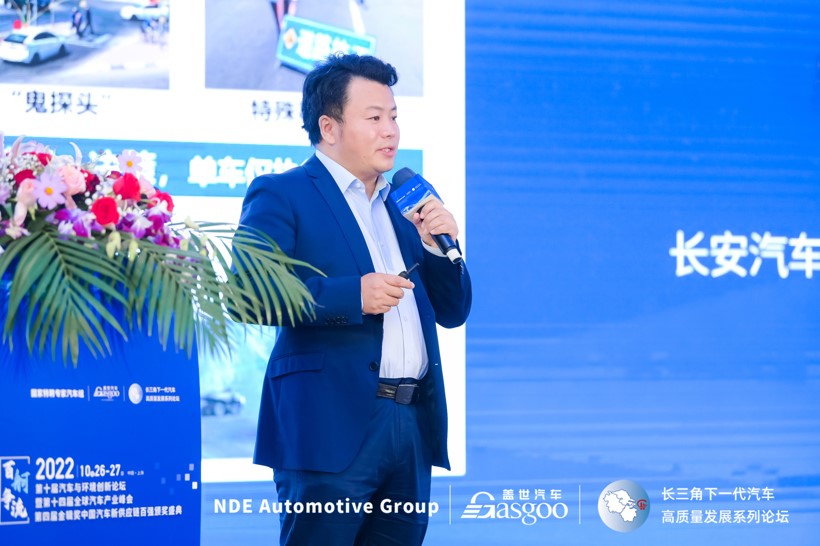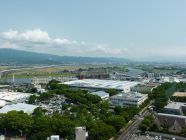On October 26, 2022, at the 2022 10th Automobile and Environment Innovation Forum and the 14th Global Automobile Industry Summit, sponsored by NDE Automotive Group and Gesch Automobile, guided by the Shanghai Hongqiao International Central Business District Management Committee and the People's Government of Minhang District, Shanghai, and co organized by Shanghai Nanhongqiao Investment and Development (Group) Co., Ltd., Liang Fenghua, deputy general manager of Chang'an Automobile Intelligence Research Institute, said:
"As a car company, Chang'an Automobile believes that the technology and core value that intelligent driving can provide for consumers should be developed around the two main lines of safety and freedom. If it is separated from such main lines, intelligent driving will be difficult to generate sustainable value."

Liang Fenghua, Deputy General Manager of Chang'an Automobile Intelligence Research Institute
The following is the content of the speech:
My sharing mainly includes three parts: Chang'an Automobile's understanding of the trend; What challenges are faced in the commercialization of intelligent driving; A series of work is being carried out by Chang'an Automobile.
Chang'an Automobile's understanding of the trend of intelligent driving
First, Chang'an Automobile's understanding of intelligent driving. Car enterprises pay more attention to the core value of intelligent driving for consumers. We believe that the technologies and core values that are ultimately provided to consumers still revolve around the two main lines of safety and freedom. If they are separated from such main lines, intelligent driving technology will be difficult to generate sustainable value.
For example, in terms of safety, intelligent driving is expected to be higher than human driving in the future, especially in terms of safety, it can be one order of magnitude higher, or even two orders of magnitude higher. Because more than 90% of traffic accidents are related to human factors, including physiological effects, emotional effects, and reaction ability.
In addition, it is also very important to liberate people from the driving process, and it is also the key, even the core, thread of intelligent driving.
The application fields of intelligent driving are very wide, including passenger vehicles, logistics, passenger transport, etc. From the current statistics and forecasts, the main market share in the future will still be concentrated in passenger cars. There are many controversial contents in the industry, such as three typical discussions: progressive and leapfrog discussions; Discussion on single vehicle intelligence and vehicle road coordination; Discussion on the fusion of pure vision and perception, etc
We believe that each route will match the corresponding business scenario. For example, gradual and leapfrog, for passenger cars, gradual should be the main line of future evolution. The scenes faced by passenger cars are very complex, and it is difficult to evolve to the final state overnight. Of course, many of these low-speed closed scenes can be achieved by leaps and bounds.
In terms of single vehicle intelligence and vehicle road collaboration, vehicle road collaboration is an important aspect in which China can play its national infrastructure advantages, but vehicle road collaboration also faces many problems that need to be solved quickly. For example, as a big sensor of the auto drive system, vehicle road collaboration itself must withstand the technical tests of reliability, functional safety, information security, accuracy, etc. required by vehicles, At the same time, we need to find a way to get through the overall business model.
With regard to the fusion of pure vision and perception, as far as driving tasks are concerned, the ultimate state of pure vision can surpass human beings. The wavelength of light that human eyes can perceive is still relatively narrow, but as a machine, it can play a better role in a wider wavelength range. In the future, the ultimate goal of the perception ability of full scene automatic driving should be higher than that of pure vision. The core determinant is still safety, and whether the safety factor of intelligent driving will be 10 times or 1000 times higher than that of human beings. This issue is being discussed continuously in the industry. We believe that it is necessary that the safety factor is one to two orders of magnitude higher than that of human beings.
The ultimate form of intelligent driving is to completely liberate and replace people. It still takes a very long time to achieve this goal, and it must be a marathon process, which requires the baptism of mass production level big data, which is insurmountable.
What challenges are faced in the commercialization of intelligent driving
The commercialization process of intelligent driving is not purely technical. We must solve the actual problems of users. In this process, intelligent driving will be in the process of assisted driving and human-computer co driving for a long time. We must solve the problem of system and human interaction.
The reason for many risks in the industry is sometimes that the relationship between the driving system's ability and the user's trust is not well handled. The user's understanding of the intelligent driving system cannot keep pace with the system capability of intelligent driving, but is more volatile. Sometimes users may be in a state of excessive trust in the system. At this time, there is a great risk, which needs to be avoided through appropriate interaction; Sometimes users are overly cautious about the system... Enterprises should explore more interaction modes to make it easier for users to use the system, but also to use the intelligent driving system very soberly.
The second challenge in the process of commercialization is safety and ethics. We believe that the problem of safety ethics can finally be solved. Germany has a series of rules for safety ethics, and this aspect is also making rapid progress in China. How much higher the safety demand and level of intelligent driving than people are is the content of ongoing discussion in the current industry.
The third challenge is how to solve the problem of safety and rapid verification. Theoretically, the verification scenarios are endless. The long-term development of intelligent driving is in a state of continuous iteration, which requires us to continuously release new software versions of intelligent driving. However, how to quickly verify each software version, especially the verification around security, is a very big challenge for us.
If we only verify in the traditional way, it will take many years for each version to be released. We believe that the future must be a combination of multiple pillars: simulation, closed site, road adaptability, etc. Most importantly, more than 99% of the future intelligent driving verification mileage will undoubtedly focus on virtual testing or simulation.
The third challenge is how to give consideration to safety and experience. If the experience is not good enough, the intelligent driving system will lose the basic value of the commodity; However, if we do not do enough in security, it will lead to greater risks. So far, there have been many risk cases in the industry. Information security, data security and other issues also need to be comprehensively addressed.
Chang'an Automobile's Practice in the Commercialization of Intelligent Driving
What has Chang'an done in the commercialization of intelligent driving? The commercialization of intelligent driving is the core theme for vehicle enterprises to carry out intelligent driving research and development. In 2018, Chang'an Automobile released the "Beidou Tianshu" intelligent strategy, the core of which is to transform into a technology company with intelligent low-carbon travel. We released the new car and new ecological strategy. In 2022, Chang'an Automobile upgraded its intelligent strategy, released the "Zhuge Intelligent" brand, and continued to promote the Beidou Tianshu Plan.
In the past two years, the carrying capacity of Chang'an L2 and above intelligent driving systems has increased rapidly, with an annual growth of 2-3 times in the past two years. In 2025, Chang'an Automobile expects that the carrying rate of systems above L2 level will reach 70% or above.
From the perspective of history, Chang'an Automobile began to deploy intelligent driving in 2010. So far, there have been 14 milestone achievements, including both technological breakthroughs and mass production breakthroughs. In the industry, in 2016, Chang'an became the first car company to complete the 2000km intelligent driving long-distance test, which is not only a sign of Chang'an's automotive technology breakthrough, but also indirectly promoted the establishment of industry regulations.
At present, the performance of the intelligent driving system that has been mass produced in Chang'an is in the forefront of the industry, and has entered the process of self research led by the whole stack. The most obvious sign is that among the models launched in Chang'an this year, the algorithms of the application layer of UNI-V's advanced intelligent driving assistance and remote intelligent parking are all developed by Chang'an. In addition, the Zhuge intelligent brand officially released by Chang'an, the intelligent driving system takes Zhuge intelligent driving as the brand label, and the core logic is to take safety as the fundamental, efficiency as the policy, comfort as the principle, and continuity as the goal, which is continuously evolving towards the ultimate state of intelligent driving.
Chang'an Automobile will continue to build a scene self-learning and style adaptive driving system, which is a key part of intelligent driving. We will not simply follow the idea of robots to create intelligent driving of cars. The user experience is the core of development. There is no doubt that the car needs to be driven more like a person, so that passengers can get a better experience, and the car enterprises can gain user recognition.
As for the experience of intelligent driving products, Chang'an Automobile officially released APA7.0 remote unmanned valet parking system in 2022. This system can be regarded as the private valet driving of the user exclusive parking lot. Chang'an Automobile will expand its use scope from inside the garage to outside the garage, and also cover the parking entrance and the underground ground of the parking lot, bringing passengers a series of experiences such as parking and remote moving.
In terms of high-speed navigation, Chang'an has created a safer and easier to use high-speed navigation auxiliary system, which can not only deal with the basic scenarios on the expressway, but also deal with more complex safety scenarios. In terms of application, Chang'an Automobile can provide a system that is more consistent with the user's usage habits, continuous iteration and customized driving style.
We also released the city self-learning navigation aid. The city navigation seen in the past will still be limited by the range of high-precision maps. Chang'an auto self-learning navigation aid can break through this range limit. After users drive the same route for a certain number of times, the system will have the ability to fix the route from point A to point B, so that the use boundary of intelligent driving can be expanded indefinitely.
In terms of core algorithms, Chang'an Automobile is constantly improving the efficiency of algorithm training and reasoning. In terms of the amount of data for network training, how to solve the problem of large data dependence, large power consumption, humanized driving decision-making, etc. are all the key issues for Chang'an Automobile to seek breakthroughs in intelligent driving algorithms.
It is far from enough to carry out AI training only according to the narrow data closed-loop. The intelligent driving data closed-loop has the following aspects: algorithm evolution closed-loop, verification enhancement closed-loop, crowdsourcing map closed-loop, and experience iteration closed-loop. Safety and reliability are the most important content of intelligent driving and the important basis for the commercialization of intelligent driving. As the leading vehicle factory in China, Chang'an Automobile has invested more resources in this regard.
Safety and reliability are the most critical basis for intelligent driving. Chang'an Automobile has established a safety development system around intelligent driving, which has been verified to be the most ISO26262 ASIL-D functional safety for automatic driving in China. The first EE level system project for intelligent driving in China has been certified by ASPICE CL2. The software capability maturity has passed CMMI 3. In terms of verification system, Chang'an Automobile has built a three-dimensional verification system, including five types of test capabilities, including field test, adaptive road test and real vehicle test. It has built hundreds of thousands of test scenarios and hundreds of millions of reasoning scenarios.
In addition, a good standard is the basis for the commercialization of intelligent driving and the premise for the efficient promotion of intelligent driving in the whole industry. Chang'an Automobile also actively supports the formulation of national standards, including the formulation of Automatic Grading of Automobile Driving, Terms and Definitions of Intelligent Connected Vehicles and V2X application level standards.
The road for intelligent driving is long, and Chang'an Automobile is very willing to work with its colleagues in the industry to jointly face many difficulties in the industry, promote the commercialization of intelligent driving, and achieve ecological win-win.
 English
English Chinese
Chinese








